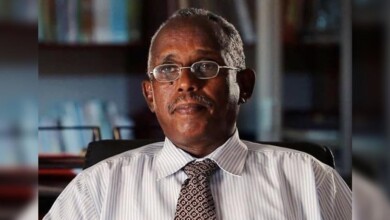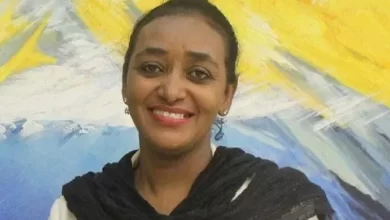Sudan is on the verge of Famine
Civilian suffering is a war beyond the war

Dr. Ismail Haggana
In light of the deteriorating humanitarian conditions in Sudan and the intensification of fighting in regions such as North Darfur, Khartoum, Al-Jazeera and Kordofan, civilians in the aforementioned regions face harsh conditions that threaten their daily lives. The World Food Programme “WFP” has announced its intention to expand the scope of its emergency food and cash assistance to stave off the looming fantom of Famine.
According to independent reports that have long been warning of the dangers of Famine occurrence, with indicators having already become clear, as citizens have begun eating tree leaves and digging ant houses in search of something that can be eaten in the area. In an act that portrays the ultimate state of despair and misery the citizens are suffering through.
People in Sudan are resorting to such desperate measures to survive, and malnutrition among children has reached horrific levels and has already caused the death of numerous children, placing an entire generation at risk.
Despite the accumulation of these disasters combined, there is no sign of peace on the horizon as the circle of war and violations expands.
In its attempts to alleviate the suffering of some Sudanese, the World Food Programme “WFP” and other international as well as Sudanese organizations aim to provide assistance to an additional five million people by the end of this year, doubling the number of people they have originally planned to support at the beginning of 2024. This effort comes in response to the urgent and growing need in Sudan. The ongoing conflict since April 2023 has greatly worsened the already deteriorating situation.
In light of this expansion of assistance, “WFP” seeks to address the deteriorating food crisis and ensure support reaches the most vulnerable groups.
Michael Dunford, World Food Programme Regional Director for East Africa, stressed that the situation in Sudan is “Already catastrophic and is likely to deteriorate further unless aid reaches those affected by the conflict.” Dunford noted that the country is already facing the largest displacement crisis in the world, warning that it could become the largest hunger crisis in the world as well.
Since the war broke out in April 2023, the World Food Programme has provided assistance to more than (6.7) million people in all (18) states of Sudan, but it urgently needs more than ($200) million to continue providing its assistance this year. Dunford described the situation in Sudan as “Not so much forgotten as it is neglected,” noting that the world must be made aware of how bleak the situation is in reality in Sudan and the urgent need to promptly take necessary measures.
Humanitarian agencies are struggling to provide aid for those in need, as food security is deteriorating dramatically and may reach unprecedented levels since the early 2000s. The World Food Programme explained that Famine-like conditions result not only from food shortages, but also from a lack of medical care and clean water, which constitutes a devastating reality for the population of Sudan.
Expanding access and opening new humanitarian routes in an equitable manner is essential to delivering food supplies to communities across the country. It also facilitates the pre-positioning process of food supplies at key border crossings that are equally controlled by both parties, and along supply routes in preparation for the rainy season that will render roads in Darfur and Kordofan impassable.
Some employees of United Nations and International Organizations succumbed to the pressure exerted by the Port Sudan authorities, which in turn led to humanitarian aid being subject to bargaining and blackmail efforts, with international and Sudanese employees fearing to lose their jobs, instead of focusing on meeting the urgent humanitarian need.
However simultaneously, a number of International and Sudanese Organizations are under tremendous pressure from the Sudanese Army in Port Sudan, with the aim of disrupting their efforts and preventing them from reaching areas outside of the Army’s control. The pressures exerted include, but are not limited to; difficulty obtaining work permits, preventing and delaying the issuance of visas, preventing some employees from working in Sudan and terminating their employment there. These actions significantly hinder the ability of these organizations to provide essential humanitarian assistance, further exacerbating the humanitarian crisis in the affected areas.
The principle of neutrality in humanitarian work, in accordance with International Humanitarian Law, requires dealing with the parties to the conflict in a manner that meets the requirements of this principle, regardless of the exerted pressure, fear and blackmail. A commitment to neutrality is fundamental to ensuring that humanitarian aid is delivered effectively and without discrimination, allowing Humanitarian Organizations to reach all parties affected by the conflict without any unjustified restrictions or interference.
In addition, the Sudanese personnel working in these organizations are under pressure, close supervision, and receive constant threats. These pressures threaten the integrity and neutrality of these organizations, as they find themselves forced to submit to these pressures to ensure the continuation of their work and avoid losing their licenses and presence in Sudan. The use of such tactics not only hampers humanitarian relief efforts, but also places the future of numerous civilians in real danger, requiring a resolute international response to ensure that aid reaches all those in need without discrimination or political interference.
The United Nations’ International Organization for Migration “IOM” has previously warned of the dangers of the number of displaced people in Sudan increasing to (10) million. The organization reported that displacement occurs under the constant threat of exchange of gunfire between the parties to the conflict, Famine, diseases, ethnic violence and gender-based violence.
The Director General of the International Organization for Migration, Amy Pope, also stressed that the humanitarian needs in Sudan are enormous and must be met immediately, calling for unified international efforts to avoid the looming fantom of Famine. However, only 19% of the required funds were provided.
According to UNICEF, (3.6) million Sudanese children suffer from Malnutrition, amid fears that many will die during the lean season, which falls between the planting and harvest seasons, when food is scarce and access is difficult due to difficult terrain.
“The situation has already reached catastrophic levels, and is likely to deteriorate further unless aid reaches all parties affected by the conflict,” confirmed the World Food Programme’s Regional Director for East Africa, Michael Dunford. Given the enormous challenges facing Sudan, the need for urgent and unified international support has become more urgent than ever.
The recent Sudanese war is undoubtedly classifies as a disaster, and the Sudanese people must reconsider in a comprehensive and objective manner, denouncing the rhetoric of hatred, condemnation and bias in positions. We must focus on the suffering of civilians and building a future that transcends the bitterness of the present, which is fueled by the historical beneficiaries of the continuation of wars in Sudan.
Those beneficiaries always seek to block any path towards democratic civil development. Such development grants the Sudanese people an opportunity to communicate away from the theories of authority that have been managing the scene for the benefit of a specific, selected groups, effectively marginalizing the rest of the citizens who possess the same rights and duties in the Sudanese State.
The incessant weaponization of war, starvation, and the prevention of humanitarian aid provision are not new tactics and it won’t be the last instance they are utilized if a true Citizenship State is not built.
The current humanitarian crisis that resulted from the ongoing war has revealed the importance of establishing a federal system that grants the public equal rights and duties and celebrates the cultural and ethnic diversity of Sudanese people. Let’s work to ensure that this war is the last war to ravage Sudan and strive to build a State that serves all citizens and not a specific group. Only in such spirit can we achieve lasting peace and a bright future for Sudan, ensuring justice, equality and sustainable development for everyone.





